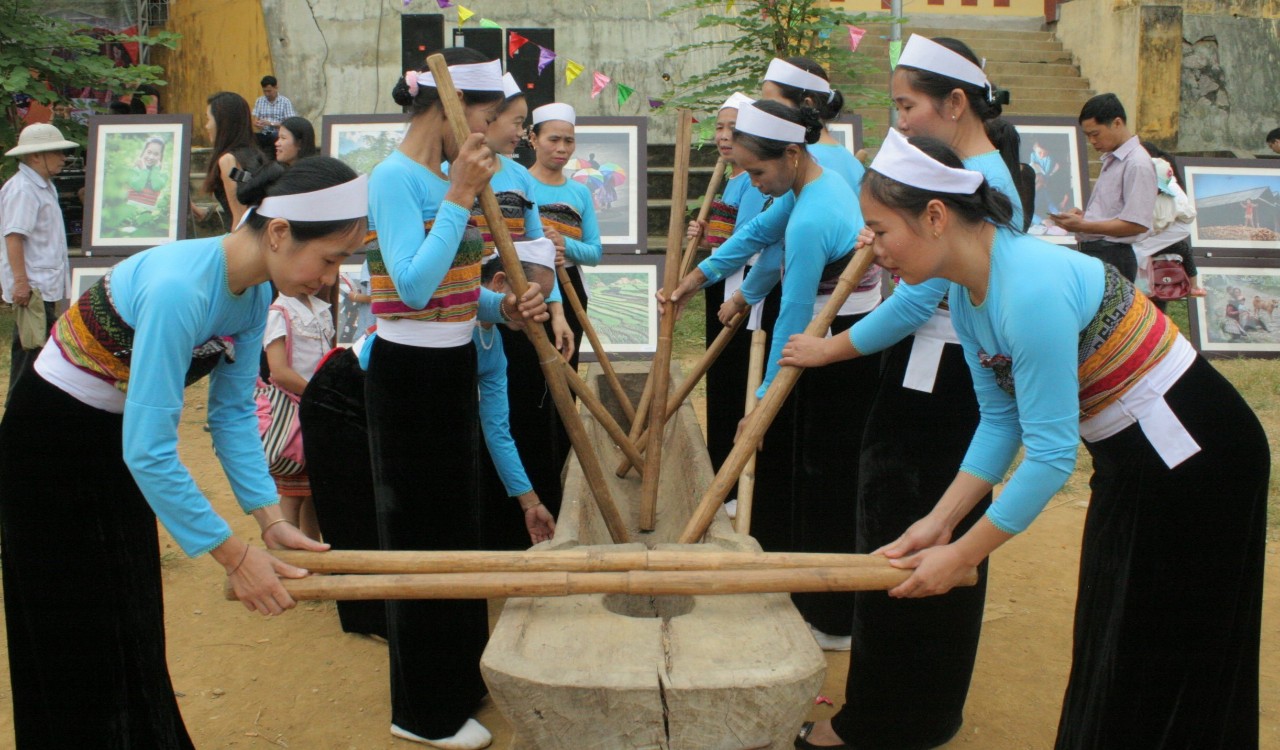
(HBO) – Keeng Loong dance is an integral part of the life of Thai people in the northern mountainous district of Mai Chau, which is performed in festivals like new rice festival, Xen ban, Cha chieng and Lunar New Year festival.

Keeng Loong dance – a special cultural identity
of the Thai group in Mai Chau district.
"Loong” is a pestle made from good timber to
create big sounds. Large, straight trees are selected and cut into pieces whose
sizes are decided by artisans. Keeng Loong has its origin in the daily life of
Thai people in Mai Chau. For Thai women, rice pounding is their daily job,
during which they often create pleasant sounds with the pestles that would help
to dispel sadness and worries. Over time, it has gradually become an art
performed during festivals, including new rice festival and wedding. Combined
with gongs, drums and bamboo sticks, it forms a joyful atmosphere. The number
of Keeng Long players depends on Loong’s size and the festival context.
Nowadays, local families no longer use Loong to
pound rice, but Loong has always been a close friend in their spiritual life.
Thai people dance Keeng Long when they are sad, and also when they are happy
like when moving to a new house or in the great national unity festival.
Its sounds can lure people to join festivals no matter what they are
doing and wherever they are.
Currently, in all Thai villages in Mai Chau
district, Keeng Loong is used to welcome tourists, becoming a traditional
cultural identity. Therefore, the preservation and promotion of the dance's
intangible cultural value is very necessary, contributing to meeting cultural
needs of people.
The provincial Department of Culture, Sports and
Tourism has recently coordinated with the Bureau of Culture and Sports of Mai
Chau district to organise a symposium on Keeng Loong.
The workshop brought together artisans from Tong
Dau, Na Phon, Mai Chau town and Chieng Chau commune. They highlighted the
cultural, scientific, historical and artistic values of Keeng Loong and
contributed ideas to complete a dossier to be submitted to the Ministry of
Culture, Sports and Tourism, seeking recognition of Keeng Long as national
intangible cultural heritage. They also proposed orientations and solutions to
preserve and promote values of Keeng Loong.
With an increasingly vibrant and widespread emulation movement aimed at building cultured residential areas and cultured families, Yen Thuy District has been making steady progress toward improving both the material and spiritual well-being of its people, while fostering a civilized, prosperous, beautiful, and progressive community.
Once lacking recreational spaces and community facilities, Residential Group 2 in Quynh Lam Ward (Hoa Binh City) has recently received attention for the construction of a new, spacious, and fully equipped cultural house. The project followed the model of state support combined with public contributions in both labor and funding.
The "All people unite to build cultural life" movement, which has been effectively integrated with Kim Boi district’s socio-economic development goals, is fostering a lively spirit of emulation across local residential areas, hamlets, villages, public agencies, and enterprises. In addition, through the initiative, traditional cultural values are being preserved and promoted, while community solidarity and mutual support in poverty reduction and economic development are being strengthened.
A working delegation of the Hoa Binh provincial People’s Committee led by its Permanent Vice Chairman Nguyen Van Toan on June 11 inspected the progress of a project to build the Mo Muong Cultural Heritage Conservation Space linked to tourism services in Hop Phong commune, Cao Phong district.
Born and growing in the heroic land of Muong Dong, Dinh Thi Kieu Dung, a resident in Bo town of Kim Boi district, in her childhood was nurtured by the sweet lullabies of her grandmother and mother. These melodies deeply imprinted on her soul, becoming an inseparable part of her love for her ethnic group's culture. For over 20 years, this love for her hometown has driven Dung to research, collect, and pass down the cultural values of the Muong people to future generations.
In the final days of May, the Ethnic Art Troupe of Hoa Binh Province organized performances to serve the people in remote, mountainous, and particularly disadvantaged areas within the province. These were not just ordinary artistic shows, but they were the meaningful journeys aimed at spreading cultural values, enhancing the spiritual life of the people and contributing to the preservation of ethnic minority cultural identities.



